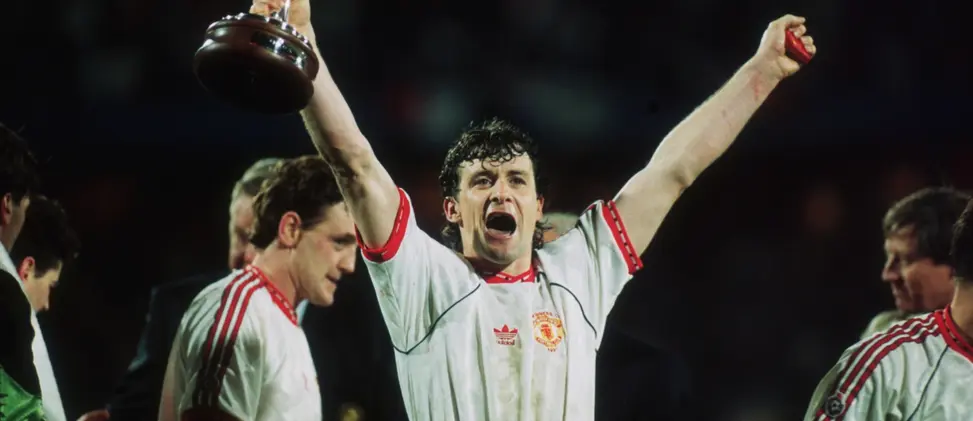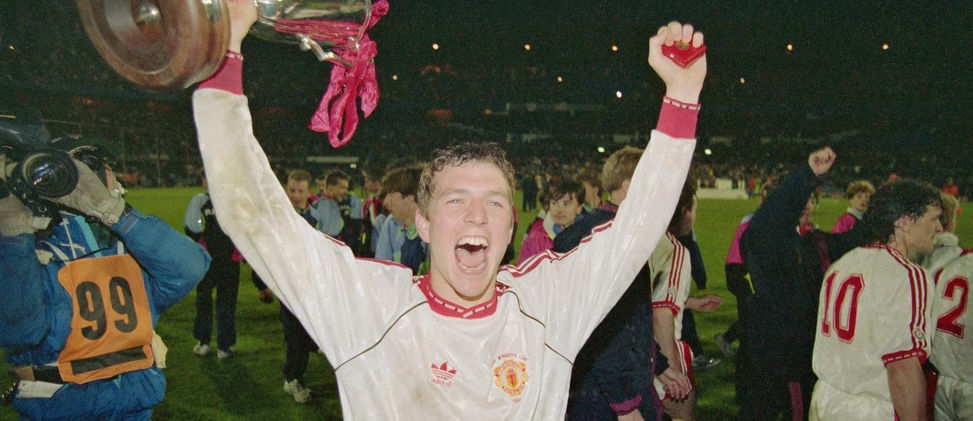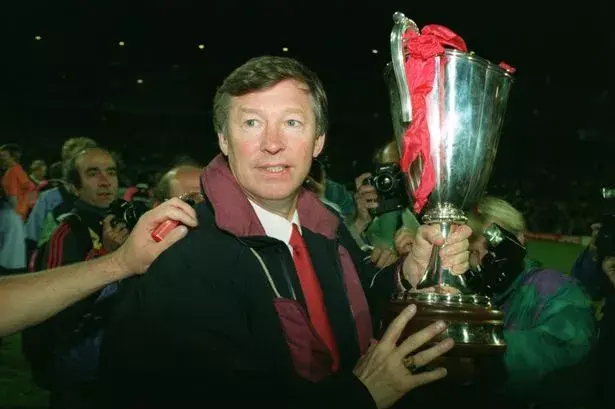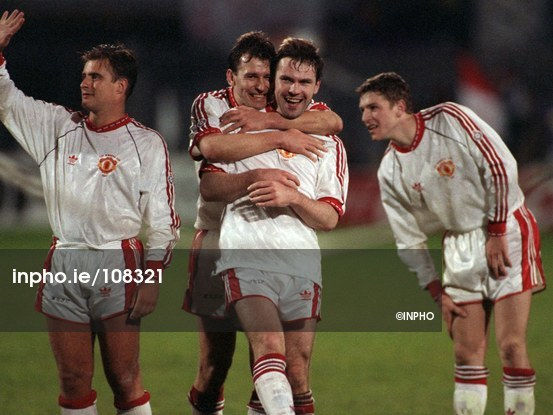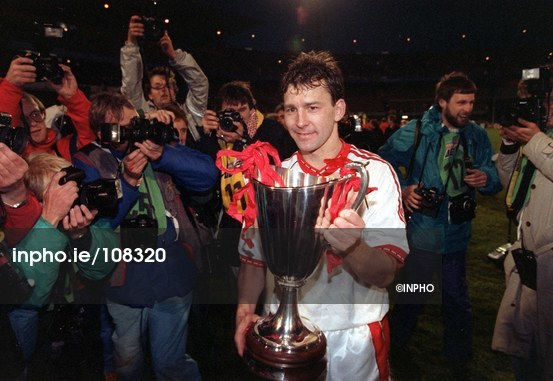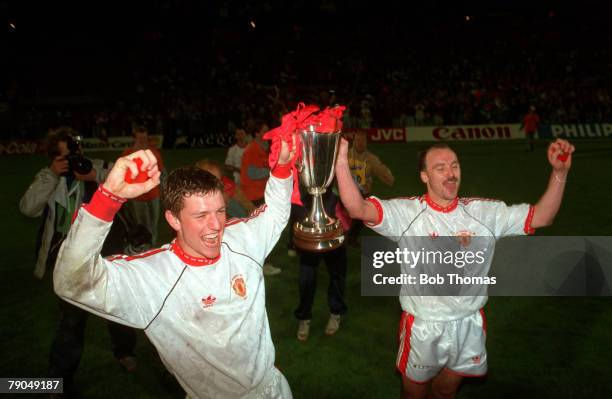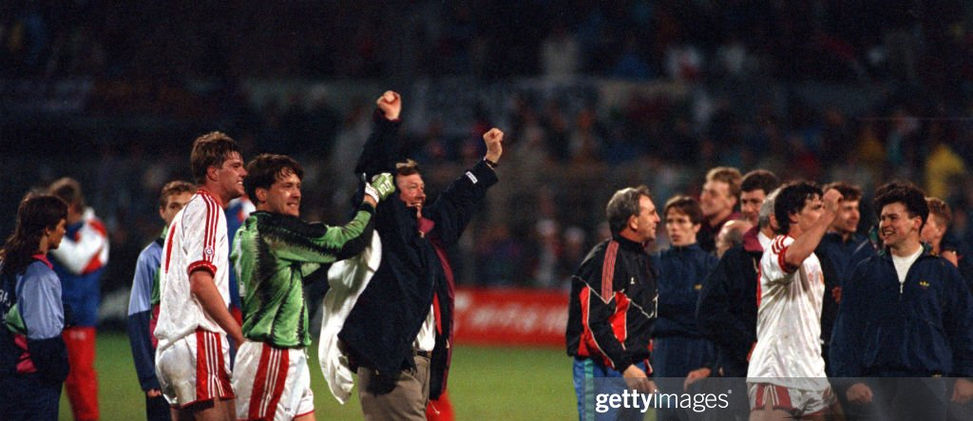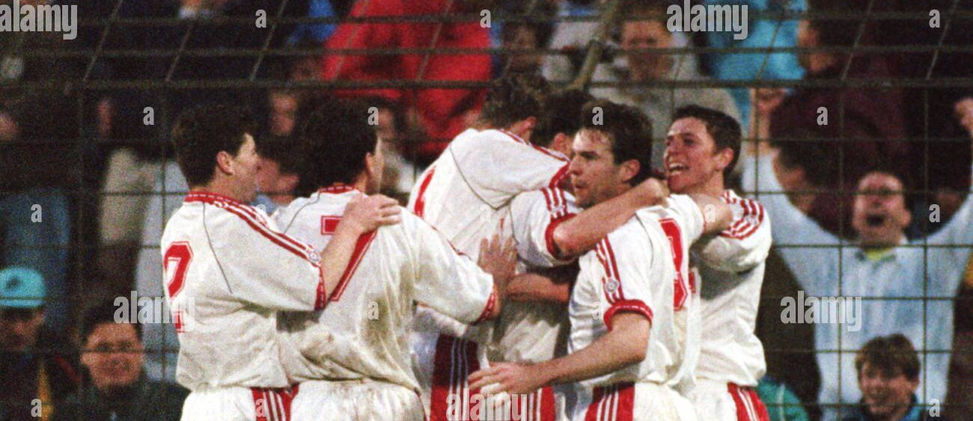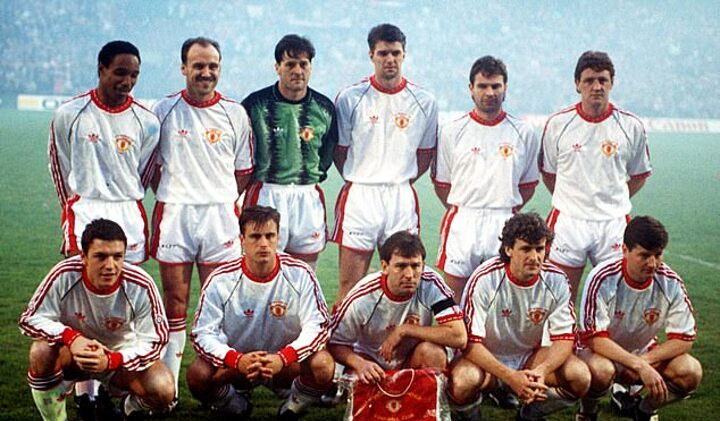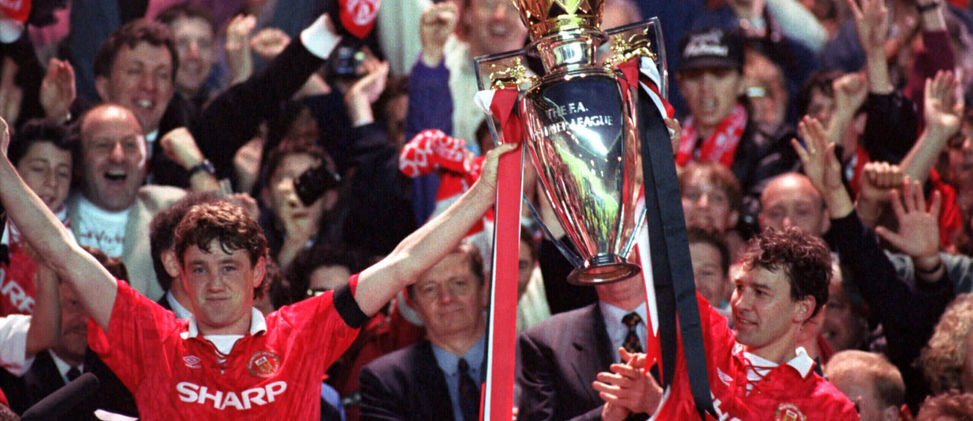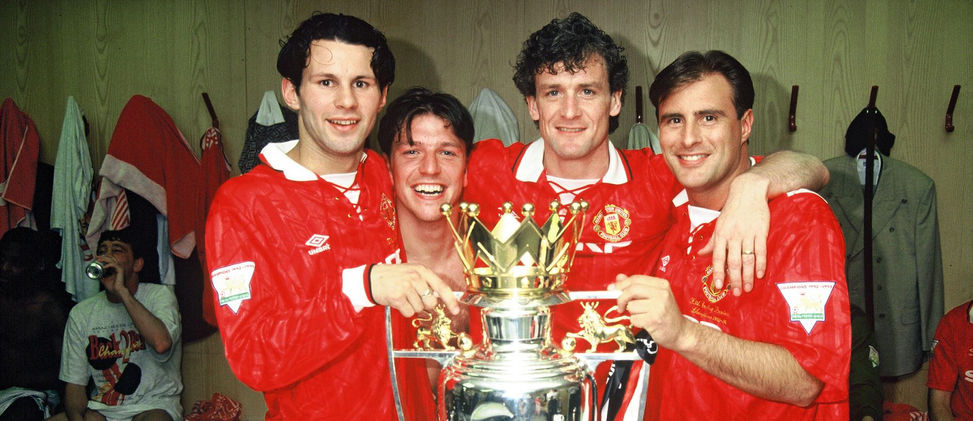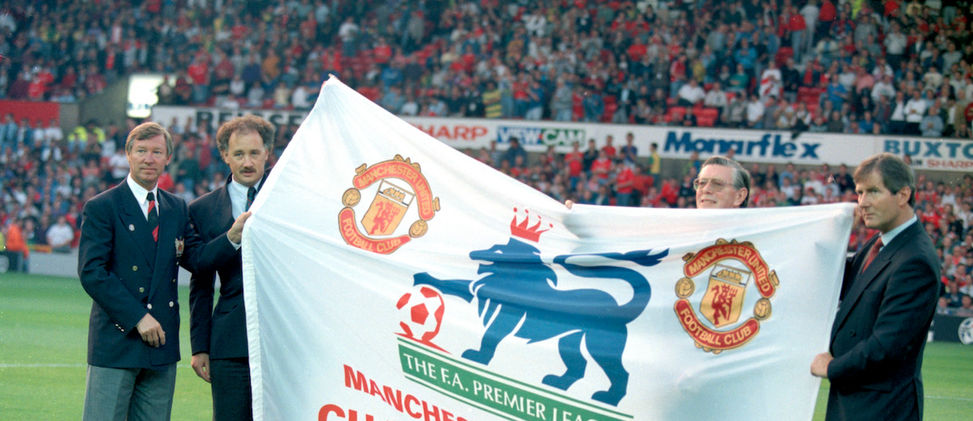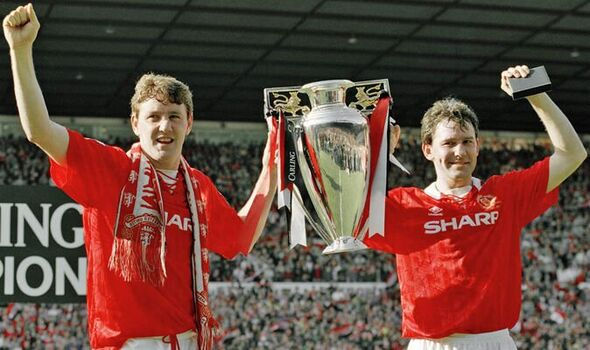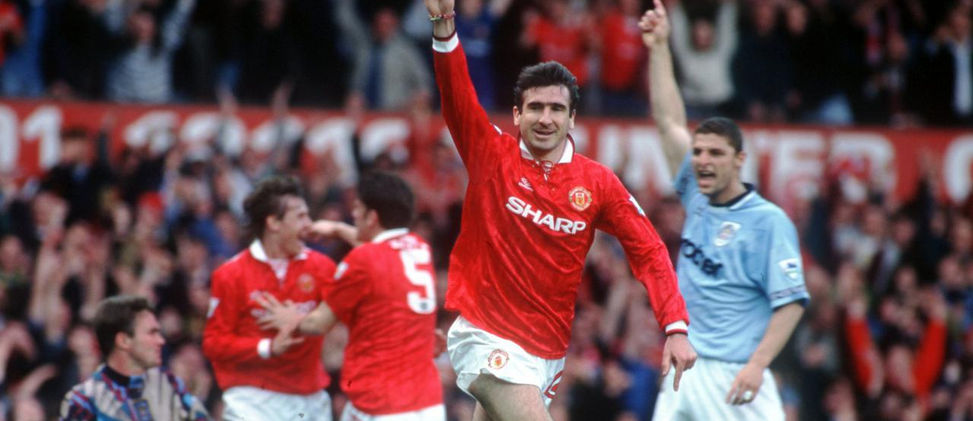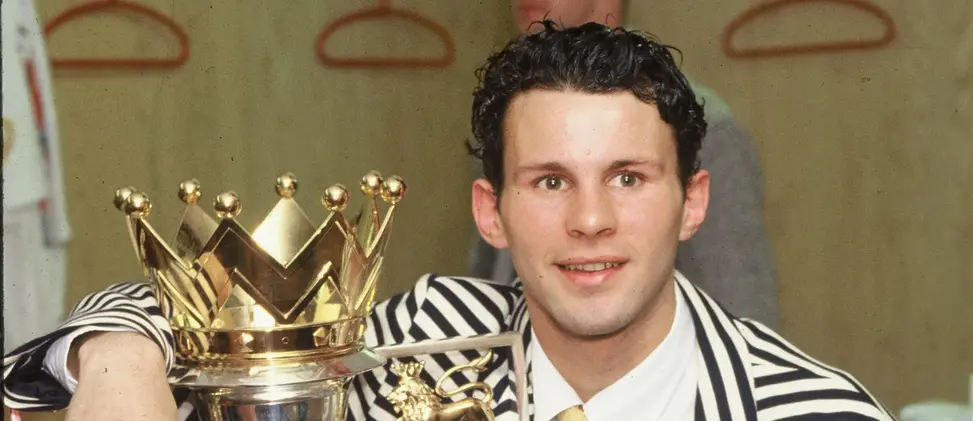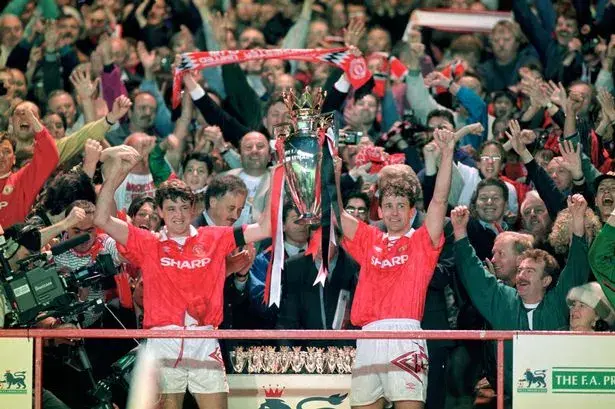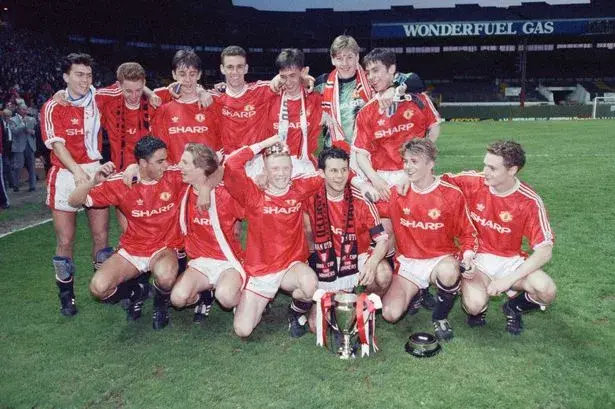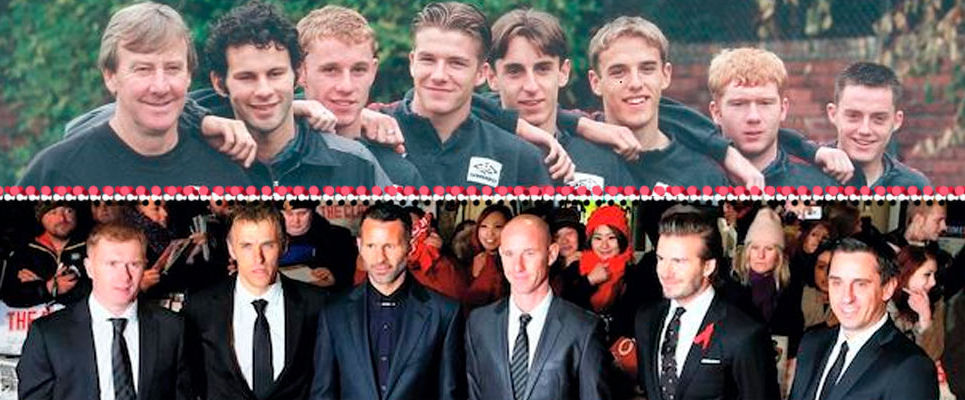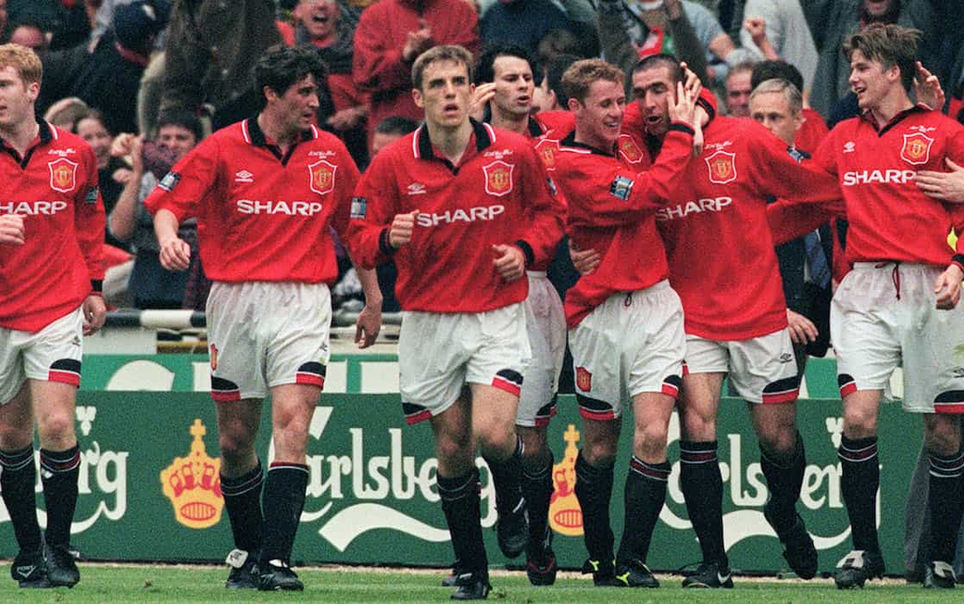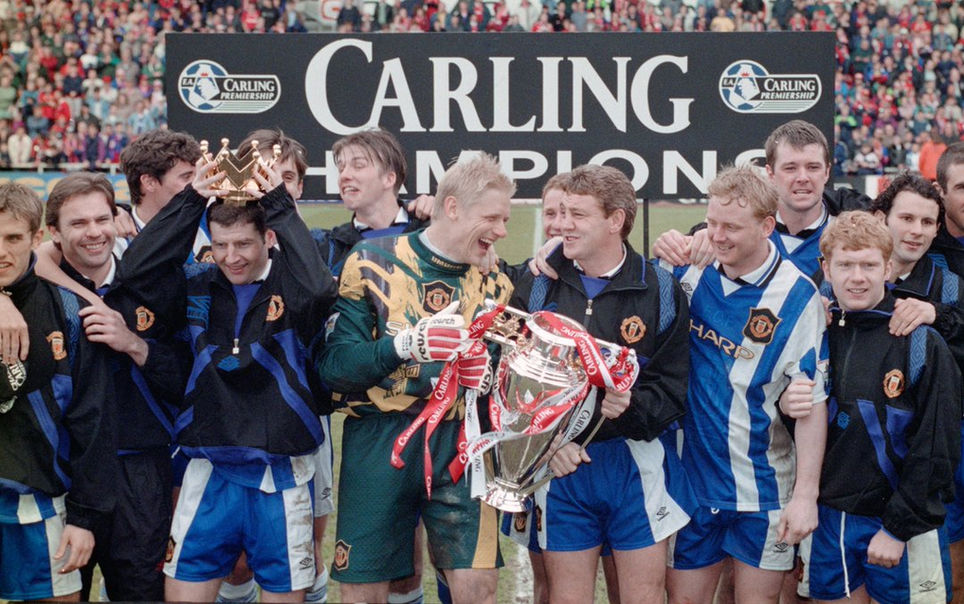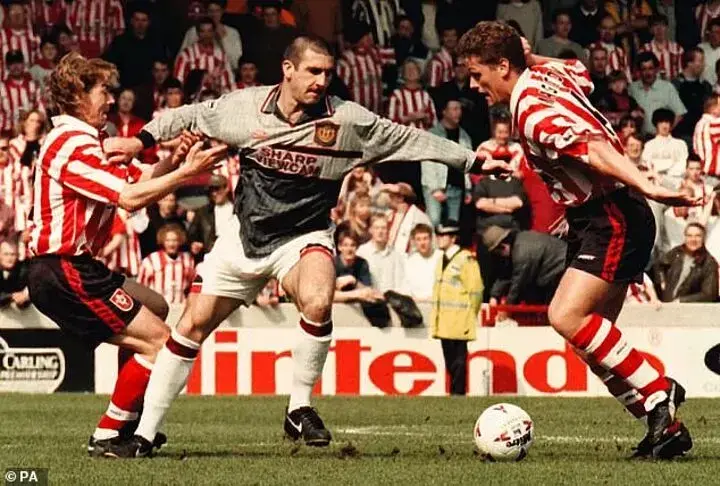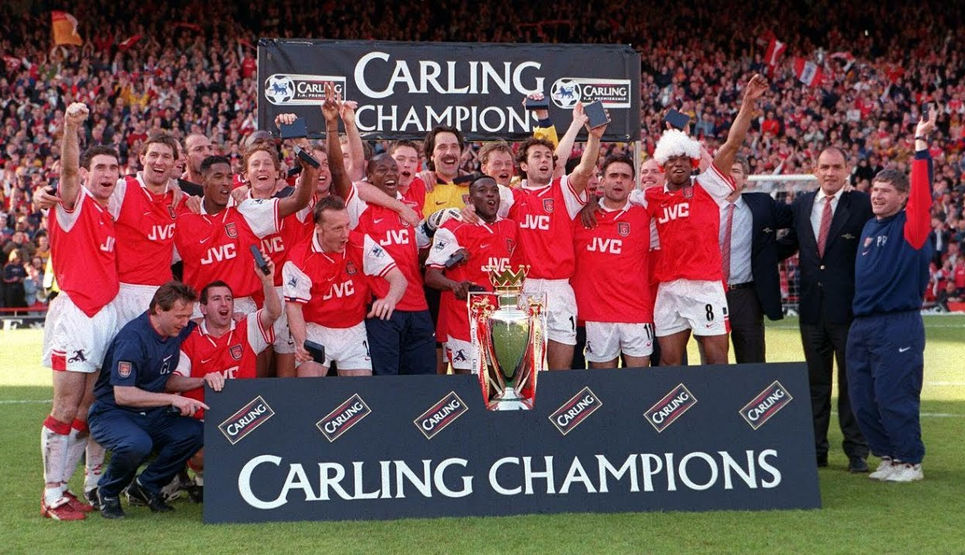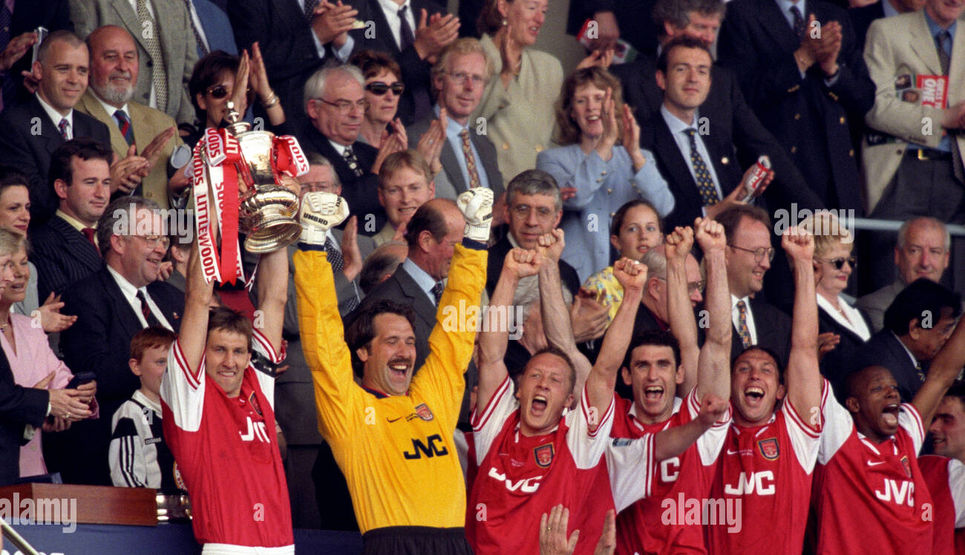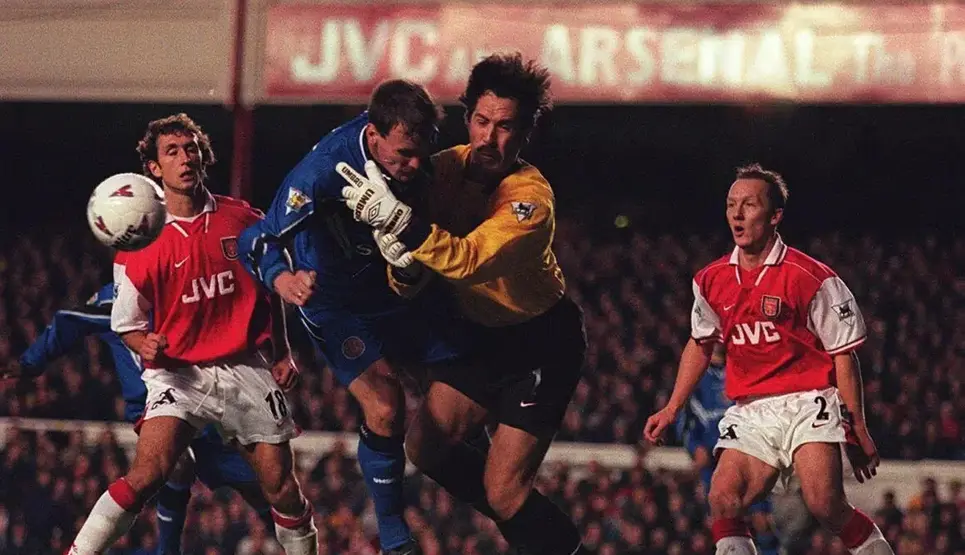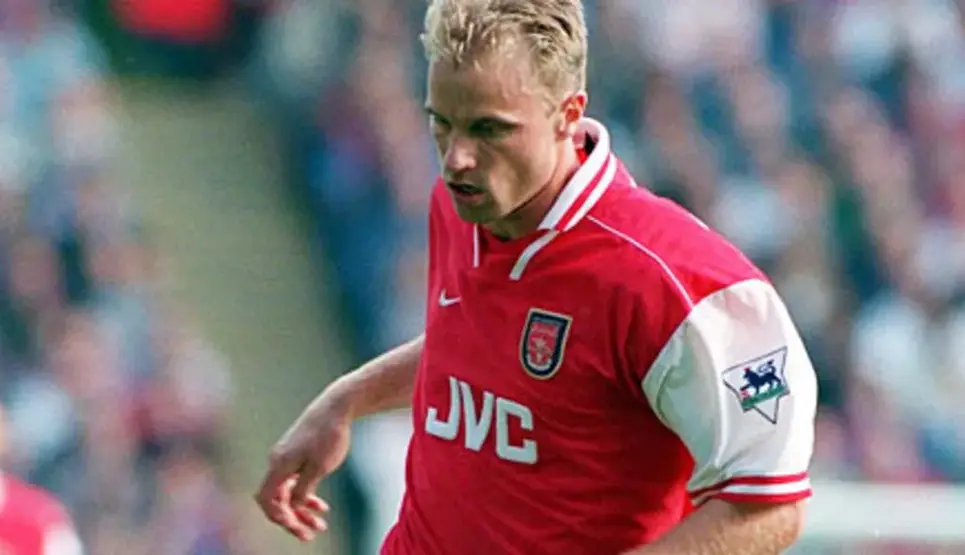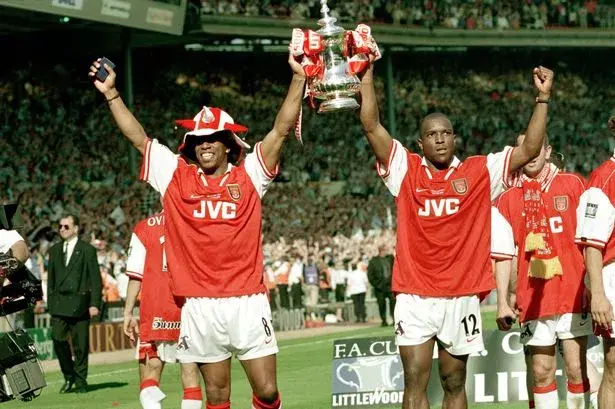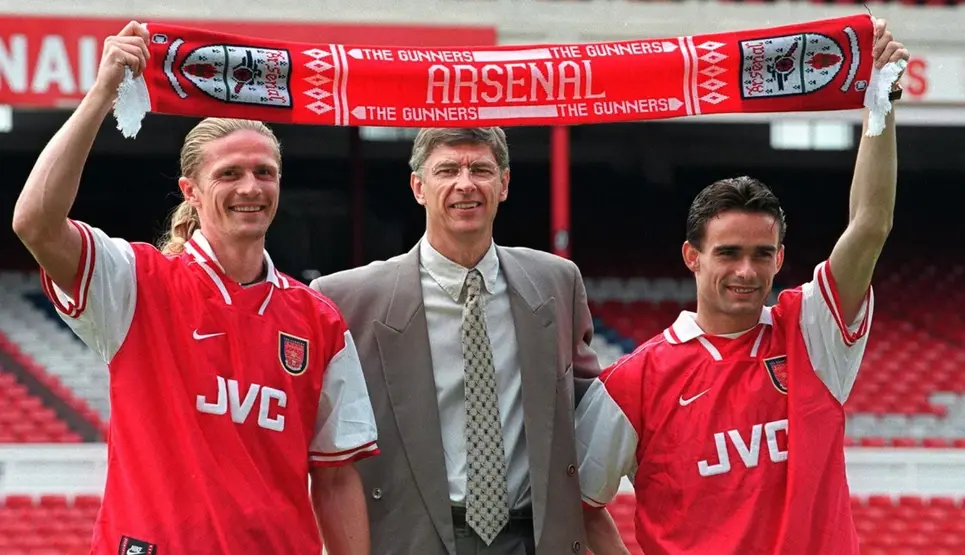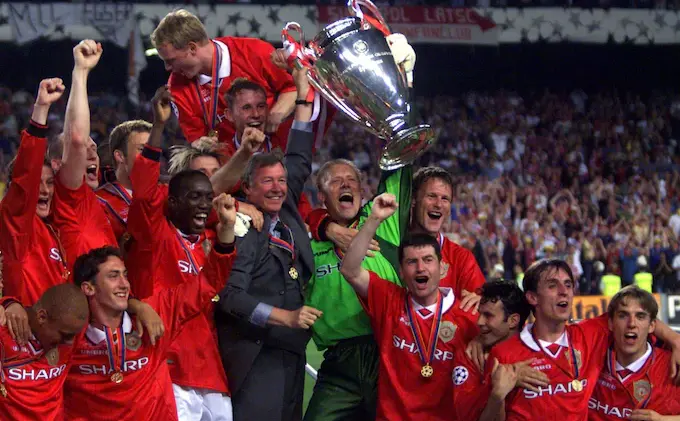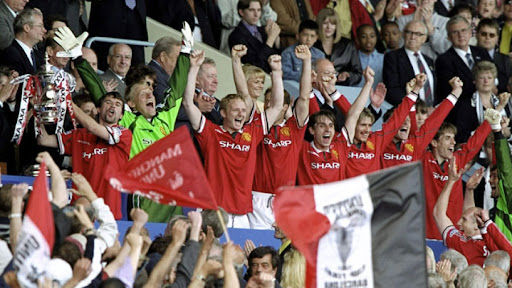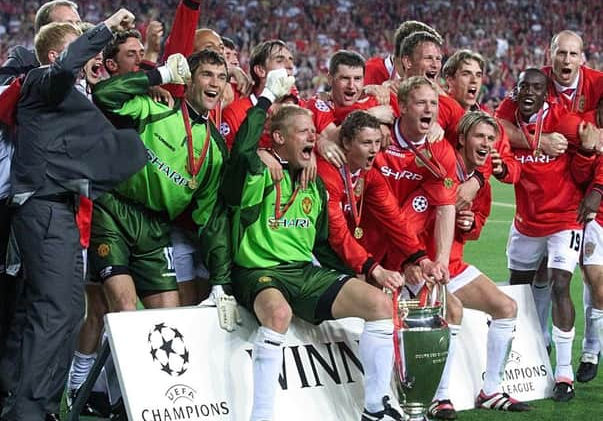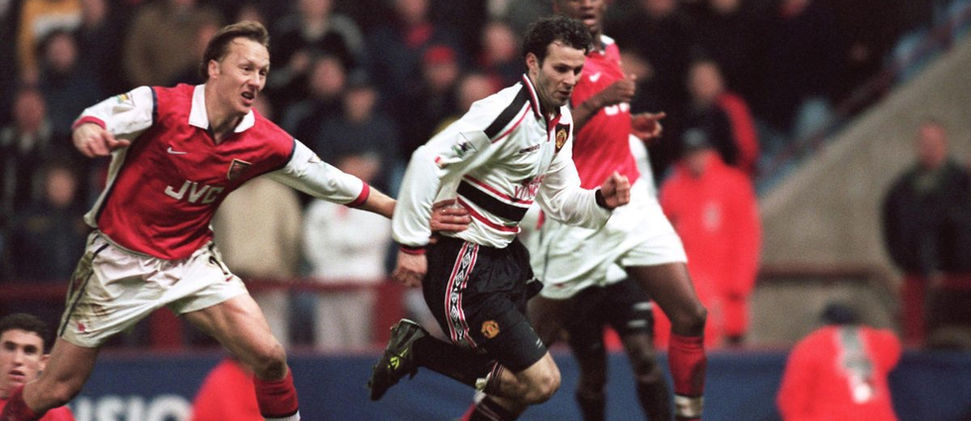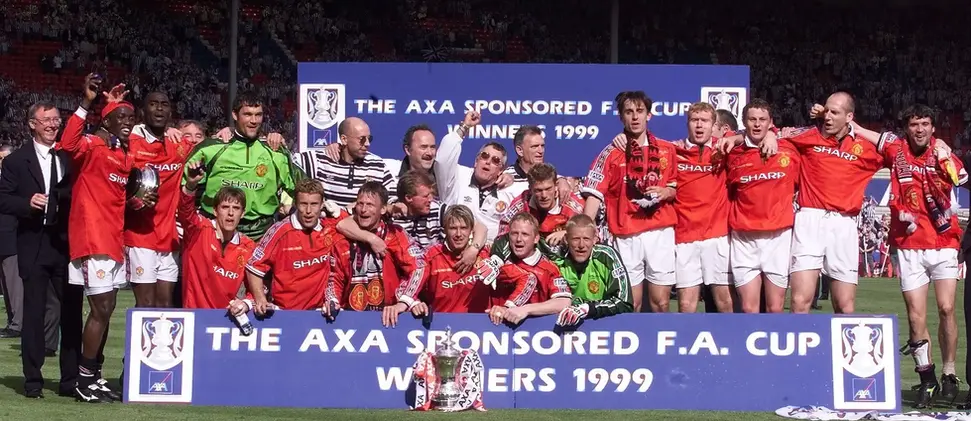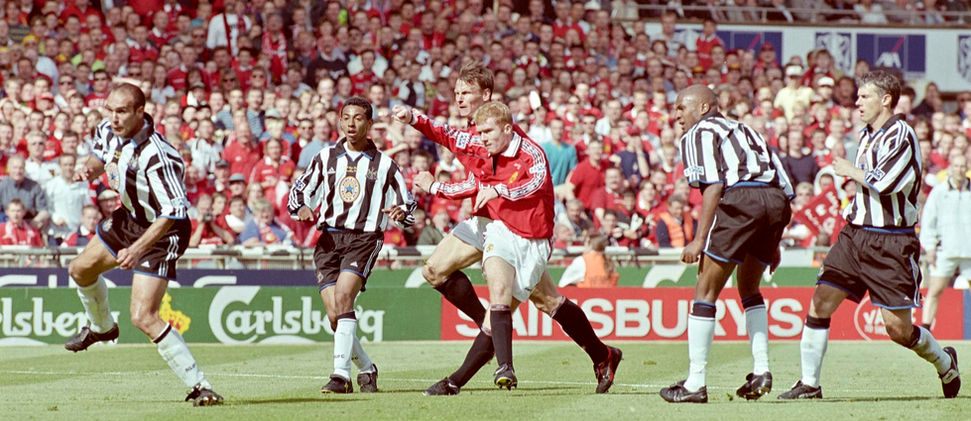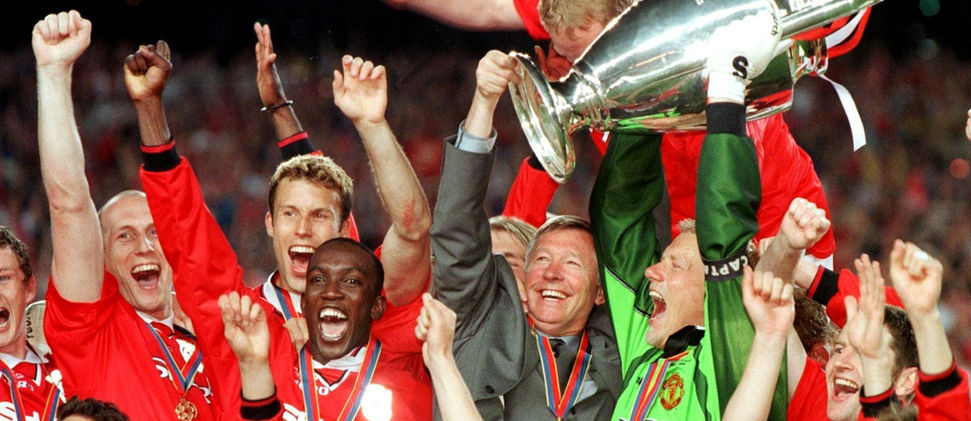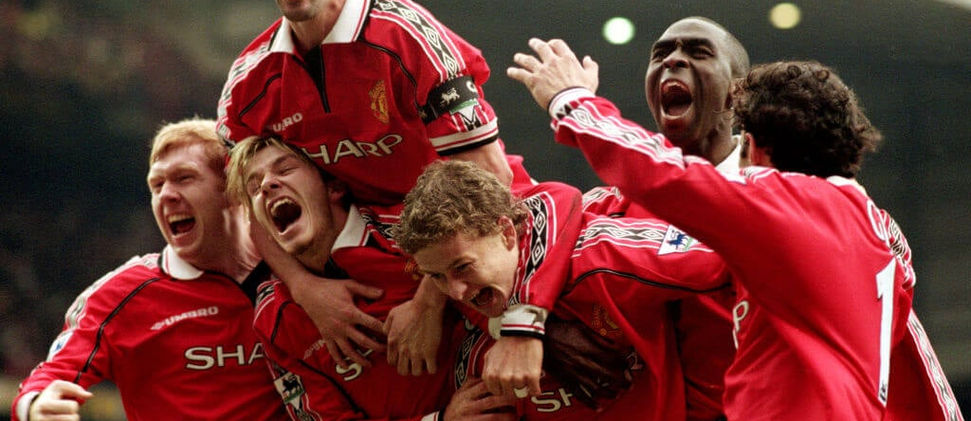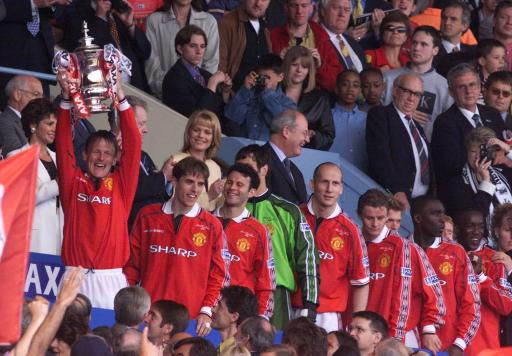

HILMANBASRI.COM
SIR ALEX FERGUSON LEGACY

Sir Alex Ferguson's legacy at Manchester United is unparalleled in the world of football, characterized by his remarkable longevity, unprecedented success, and profound impact on the club. Appointed in November 1986, Ferguson transformed Manchester United from a struggling giant into one of the most dominant and successful clubs in football history.
During his 26-year tenure, Ferguson won 38 major trophies, including 13 Premier League titles, five FA Cups, and two UEFA Champions League titles. His success was built on a foundation of discipline, hard work, and an unyielding desire to win. Ferguson's ability to adapt to the evolving nature of football, innovate tactics, and rebuild successful teams over different eras set him apart from his contemporaries.
One of Ferguson's most notable achievements was breaking Liverpool's dominance and guiding Manchester United to their first league title in 26 years in the 1992-93 season. This triumph marked the beginning of an era of unprecedented success. The 1998-99 season stands out as a pinnacle of his career, where United achieved an historic treble, winning the Premier League, FA Cup, and UEFA Champions League.
Ferguson's legacy also includes his eye for talent and ability to nurture young players. The Class of '92, featuring players like Ryan Giggs, David Beckham, Paul Scholes, Gary Neville, and Nicky Butt, epitomized Ferguson's belief in youth development. His trust in these young talents paid off, as they became the backbone of United's success for years.
Beyond his tactical acumen and managerial skills, Ferguson's man-management and motivational abilities were legendary. He fostered a winning mentality, instilled discipline, and created a culture of excellence at the club. His famous "hairdryer treatment" was a testament to his demanding nature, yet his loyalty and support for his players endeared him to many.
Ferguson's influence extended beyond the pitch. He played a significant role in shaping Manchester United's global brand, making it one of the most recognizable and supported football clubs worldwide. His impact on the club's commercial success and global reach cannot be overstated.
Sir Alex Ferguson's legacy at Manchester United is not just measured in trophies, but in the lasting culture of excellence, resilience, and success he instilled. His tenure set the standard for managerial excellence and left an indelible mark on the history of football.
ARRIVAL OF ALEX FERGUSON


Ferguson was appointed manager at Old Trafford on 6 November 1986. He was initially worried that many of the players, such as Norman Whiteside, Paul McGrath and Bryan Robson were drinking too much and was "depressed" by their level of fitness, but he managed to increase the players' discipline and United climbed up the table to finish the season in 11th place, having been 21st (second from bottom) when he took over.
His first game in charge was a 2–0 defeat at Oxford United on 8 November, followed seven days later by a goalless draw at newly promoted Norwich City, and then his first win (1–0 at home to Queens Park Rangers) on 22 November. Results steadily improved as the season went on, and by the time they recorded what would be their only away win of the league campaign at title challengers and rivals Liverpool on Boxing Day, it was clear that United were on the road to recovery. The year 1987 began on a high note with a 4–1 victory over Newcastle United and United gradually pulled together in the second half of the season, with relatively occasional defeats on the way, and finished 11th in the final table. Ferguson's mother Elizabeth died of lung cancer, aged 64, three weeks after his appointment. Ferguson hired Archie Knox, his assistant at Aberdeen, in the same role at Manchester United in 1986.
BUILDING A DYNAMIC TEAM



In the 1987–88 season, Ferguson made several major signings, including Steve Bruce, Viv Anderson and Brian McClair. The new players made a positive contribution to a United team who finished in second place, nine points behind Liverpool. Liverpool's points lead, however, had been in double digits for most of the season and while United had lost only five league games all season, they drew 12 games and there was clearly still some way to go before United could be a match for their northwestern rivals.
During the season, United played two friendly matches in Bermuda against the Bermuda national team and the Somerset Cricket Club. In the match against Somerset, both Ferguson himself and his assistant Archie Knox took to the field, with Knox even getting on the scoresheet. The match was Ferguson's only appearance for the Manchester United first team.


United were expected to do well when Mark Hughes returned to the club two years after leaving for Barcelona, alongside Jim Leighton from Aberdeen; but the 1988–89 season was a disappointment for them, finishing 11th in the league and losing 1–0 at home to Nottingham Forest in the FA Cup sixth round. They had begun the season slowly, going on a nine-match winless run throughout October and November (with one defeat and eight draws) before a run of generally good results took them to third place and the fringes of the title challenge by mid February. However, another run of disappointing results in the final quarter of the season saw them fall down to mid-table.


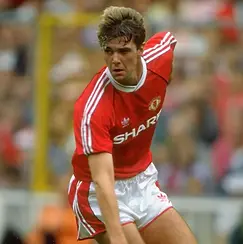

For the 1989–90 season, Ferguson further boosted his squad by paying large sums of money for midfielders Neil Webb, Mike Phelan, and Paul Ince, as well as defender Gary Pallister and winger Danny Wallace. The season began well with a 4–1 win over defending champions Arsenal on the opening day, but United's league form quickly turned sour. In September, United suffered a humiliating 5–1 away defeat against fierce rivals Manchester City. Following this and an early season run of six defeats and two draws in eight games, a banner declaring, "Three years of excuses and it's still crap ... ta-ra Fergie." was displayed at Old Trafford, and many journalists and supporters called for Ferguson to be sacked. Ferguson later described December 1989 as "the darkest period [he had] ever suffered in the game", as United ended the decade just outside the relegation zone.



Following a run of seven games without a win, Manchester United were drawn away to Nottingham Forest in the third round of the FA Cup. Forest were performing well that season and were in the process of winning the League Cup for the second season running, and it was expected that United would lose the match and Ferguson would consequently be sacked, but United won the game 1–0 due to a Mark Robins goal and eventually reached the final. This cup win is often cited as the match that saved Ferguson's Old Trafford career. United went on to win the FA Cup, beating Crystal Palace 1–0 in the final replay after a 3–3 draw in the first match, giving Ferguson his first major trophy as Manchester United manager. United's defensive frailties in the first match were blamed on goalkeeper Jim Leighton. Ferguson dropped Leighton for the replay, bringing in Les Sealey.



Although United's league form improved greatly in 1990–91, they were still inconsistent and finished sixth. There were some excellent performances that season, including a 6–2 demolition of Arsenal at Highbury, but results like an early 2–1 loss at newly promoted Sunderland, a 4–0 September hammering by Liverpool at Anfield, and a 2–0 home defeat by Everton in early March (the game where 17-year-old talented prospect Ryan Giggs made his senior debut) showed that United still had some way to go.
1991 CUP WINNERS CUP
Even after the FA Cup victory in the previous season, some still had doubts about Ferguson's ability to succeed where all the other managers since Matt Busby had failed – to win the league title. They were runners-up in the League Cup, losing 1–0 to Sheffield Wednesday. However, they won the European Cup Winners' Cup, beating that season's Spanish champions Barcelona 2–1. It would be United's only Cup Winners' Cup title. After the match, Ferguson vowed that United would win the league the following season, and at long last he seemed to have won over the last of his sceptics after nearly five years in the job.
THE START FOR SCHMEICHEL



During the 1991 close season, Ferguson's assistant Archie Knox departed to Rangers to become assistant to Walter Smith, and Ferguson promoted youth team coach Brian Kidd to the role of assistant manager in Knox's place. He also made two major signings – goalkeeper Peter Schmeichel and defender Paul Parker – to bolster his side. There was much anticipation about the breakthrough of the young Ryan Giggs, who had played twice and scored once in the 1990–91 campaign, and the earlier emergence of another impressive young winger in the shape of Lee Sharpe, who despite their youth had made Ferguson feel able to resist plunging into the transfer market and buying a new player to take over from the disappointing Danny Wallace on the left wing. He had also added Soviet midfielder Andrei Kanchelskis to the right wing, giving him a more attacking alternative to older midfielders Mike Phelan and Bryan Robson.
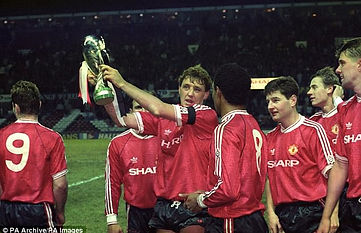


The 1991–92 season did not live up to Ferguson's expectations and, in Ferguson's words, "many in the media felt that [his] mistakes had contributed to the misery". United won the League Cup and European Super Cup; both for the first time, but lost out on the league title to rivals Leeds United after leading the table for much of the season. A shortage of goals and being held to draws by teams they had been expected to beat in the second half of the campaign had proved to be the undoing of a United side who had performed so well in the first half of the season. Ferguson felt that his failure to secure the signing of Mick Harford from Luton Town had cost United the league, and that he needed "an extra dimension" to the team if they were to win the league the following season.

During the 1992 close season, Ferguson went on the hunt for a new striker. He first attempted to sign Alan Shearer from Southampton, but lost out to Blackburn Rovers. He also made at least one approach for the Sheffield Wednesday striker David Hirst, but manager Trevor Francis rejected all offers and the player stayed put. In the end, he paid £1 million for 23-year-old Cambridge United striker Dion Dublin – his only major signing of the summer.
THE ARRIVAL OF ERIC CANTONA



After a slow start to the 1992–93 season by sitting 10th at the beginning of November, it looked as though United would miss out on the league title yet again. However, after the purchase of French striker Eric Cantona from Leeds for £1.2 million, the future of Manchester United, and Ferguson's position as manager, began to look bright. Cantona formed a strong partnership with Mark Hughes.
1992-1993 PREMIERSHIP CHAMPION
On 10 April 1993, United were second in the league when they faced Sheffield Wednesday at home. United were losing with four minutes to go before Steve Bruce equalised. After 7 minutes of injury time – which was subsequently dubbed "Fergie Time", alluding to extra minutes allegedly being granted to Ferguson's teams to get a goal – Bruce scored the 97th minute winner, with Ferguson celebrating the goal by running from his dugout on to the touch line, while assistant Brian Kidd ran on to the field.Seen as being a decisive victory, it put United top of the league, where they remained. Winning the title ended United's 26-year wait for a league title, and also made them the first Premier League champions. United finished with a ten-point margin over runners-up Aston Villa, whose 1–0 defeat at Oldham Athletic on 2 May 1993 had given United the title. Ferguson was later voted Manager of the Year by the League Managers' Association.



The 1993–94 season brought more success. Ferguson added Nottingham Forest's 22-year-old midfielder Roy Keane to the ranks for a British record fee of £3.75 million as a long term replacement for Bryan Robson, who was nearing the end of his career. United led the 1993–94 Premier League table virtually from start to finish. Ferguson was the first winner of the Premier League Manager of the Month award, introduced for the start of the 1993–94 season, when he collected the accolade for August 1993. Cantona was top scorer with 25 goals in all competitions despite being sent off twice in the space of five days in March 1994. United also reached the League Cup final but lost 3–1 to Aston Villa, managed by Ferguson's predecessor, Ron Atkinson. In the FA Cup final, Manchester United achieved an impressive 4–0 scoreline against Chelsea, winning Ferguson his second League and Cup Double, following his Scottish Premier Division and Scottish Cup titles with Aberdeen in 1984–85, though the League Cup final defeat meant that he had not yet achieved a repeat of the treble that he had achieved with Aberdeen in 1983.
FERGIE'S FLEDGLINGS - CLASS OF 92
A second wave of young players emerged at Manchester United in the early to mid-1990s. This group proved far more successful than the late 1980s generation of players in terms of the success they achieved in the short and long term. Each one was developed by Manchester United from a very early age, some signing schoolboy forms with the club at the age of just 14. Many of these players were part of the Manchester United team that won the 1992 FA Youth Cup, including future United regulars David Beckham, Nicky Butt, Ryan Giggs and Gary Neville. Also generally considered in this group are players such as Paul Scholes, an FA Youth Cup finalist in 1993 and Phil Neville – Gary's younger brother – who was a substitute in the 1993 FA Youth Cup Final and captained the team to the 1995 FA Youth Cup. The six players have since been collectively referred to as the "Class of '92", a term popularised by the namesake 2013 documentary focusing on their careers with the club.



Ferguson made only one close-season signing, paying Blackburn £1.2 million for David May. There were newspaper reports that Ferguson was also going to sign highly rated 21-year-old striker Chris Sutton from Norwich City, but the player headed for Blackburn instead. 1994–95 was a harder season for Ferguson. Cantona assaulted a Crystal Palace supporter in a game at Selhurst Park, and it seemed likely he would leave English football. An eight-month ban saw Cantona miss the final four months of the season. He also received a 14-day prison sentence for the offence but the sentence was quashed on appeal and replaced by a 120-hour community service order. United paid a British record fee of £7 million for Newcastle United's prolific striker Andy Cole, with young winger Keith Gillespie heading to the north-east in exchange. The season also saw the breakthrough of young players Gary Neville, Nicky Butt and Paul Scholes, who provided excellent cover for the long periods that United were left without some of their more experienced stars. However, the championship slipped out of Manchester United's grasp as they drew 1–1 with West Ham United on the final day of the season, when a win would have given them a third successive league title. United also lost the FA Cup final in a 1–0 defeat by Everton.



1995–98
Ferguson was heavily criticised in the summer of 1995 when three of United's star players were allowed to leave and replacements were not bought. First Paul Ince moved to Internazionale of Italy for £7.5 million, long-serving striker Mark Hughes was sold to Chelsea in a £1.5 million deal, and Andrei Kanchelskis was sold to Everton. Ferguson felt that United had a number of young players who were ready to play in the first team. The youngsters, who would be known as "Fergie's Fledglings", included Gary Neville, Phil Neville, David Beckham, Paul Scholes and Nicky Butt, who would all go on to be important members of the team. And so the 1995–96 season began without a major signing, at a time when the likes of Arsenal, Liverpool and Newcastle were making the headlines with big-money signings.
1995-1996 PREMIERSHIP CHAMPION
A youthful United team lost 3–1 in their opening league game of the 1995–96 season, against Aston Villa. On Match of the Day, pundit Alan Hansen criticised their performance, ending his analysis with the words, "You can't win anything with kids." United won their next five matches and were boosted by the return of Cantona, who made his comeback against Liverpool in October 1995. For much of the season, the team trailed league leaders Newcastle and found themselves ten points behind by Christmas; this later was narrowed to seven points after defeating them on 27 December 1995. The gap increased to 12 points, but a series of wins, coupled with Newcastle dropping points, meant by late March, United moved to the top of the table. In a televised outburst after his team's win against Leeds, Newcastle manager Kevin Keegan responded angrily to Ferguson's comments: "We're still fighting for this title, and he's got to go to Middlesbrough ... I would love it if we beat them, love it." A win against Middlesbrough on the final day sealed the title for United and the team beat Liverpool by a goal to nil to win the 1996 FA Cup Final; this was their second double in three years. A week after the cup final, Ferguson agreed a four-year contract to remain at United.




United started the following season thrashing the previous year's league runners-up Newcastle 4-0 in the Charity Shield. They went on to win their fourth league title in five seasons at the end of the 1996–97 campaign, made easier by the fact that their rivals were "not up to the job". Under Ferguson, the team made a better go in the Champions League and reached the semi-final stage for the first time in 28 years. United did not advance any further, after defeat by Borussia Dortmund of Germany. Norwegian signings Ole Gunnar Solskjær and Ronny Johnsen were the notable additions to the squad, with the former ending the season as the club's top goalscorer. In May 1997, Cantona informed Ferguson of his decision to retire from football. The player "felt exploited by United's merchandising department" and questioned the ambition of the club, reasons which Ferguson understood. Striker Teddy Sheringham was signed as Cantona's replacement from Tottenham Hotspur, with Blackburn defender Henning Berg the other significant purchase that summer. In the close season, United appointed Keane as their new captain. Ferguson described him as "the best all-round player in the game" after the team's 1997 FA Charity Shield win and believed Keane had "all the right ingredients" to succeed from Cantona.
LOSING OUT TO ARSENAL
Defeat by Leeds United in September 1997 was the team's first league loss in seven months; Keane during the match injured himself and was subsequently ruled out for the rest of the season with ligament damage. Goalkeeper Peter Schmeichel was placed as captain in his absence. By November, United opened up a four-point lead in the league, which prompted talk of whether any team could catch them. After Arsenal's defeat of United in the same month, Ferguson acknowledged a one-horse race was "not good for the game" and admitted his opponents "... deserved to win on their second-half performance". The fallibilities of Liverpool, Chelsea and Blackburn as league challengers allowed United during the winter to extend their lead by 11 points, albeit with Arsenal having games-in-hand. This was enough for Manchester bookmaker Fred Done to pay out on punters who backed the champions retaining their title.



Arsenal collected maximum points, sealing the title with a win against Everton on 3 May 1998. Ferguson congratulated his opponent Arsène Wenger, who in his first full season at the club, later completed the double: "I think it's good for my young players to lose on this occasion. I wholeheartedly acknowledge what Arsenal achieved between Christmas and the end of the season." United straight after paid £10.75 million for PSV defender Jaap Stam, a new club record fee. Ferguson wanted to strengthen the squad's attacking options and identified Aston Villa's Dwight Yorke as his main target. Attempts to sign Yorke were rebuffed at first, before Ferguson persuaded Edwards to increase United's initial offer of £10 million. A £12.6 million deal was reached a week into the league campaign; Yorke signed minutes before the deadline to submit United's squad for the Champions League.

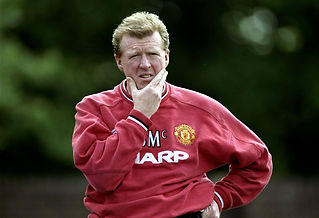

1998–99: Treble success
United opened the 1998–99 season with a 3–0 loss to Arsenal in the 1998 FA Charity Shield.[106] The beating did not concern Ferguson, though he described his team's defeat by Arsenal in September 1998 as "a lot less tolerable". In December 1998, Kidd left his role as assistant to become the manager of Blackburn Rovers. Ferguson instructed Eric Harrison and Les Kershaw to find suitable replacements, "in terms of coaching ability and work ethic." Both recommended Steve McClaren, the assistant to Jim Smith at Derby County. McClaren was Ferguson's initial choice and appointed him in February 1999. His first game as assistant was United's 8–1 victory over Nottingham Forest.
Ferguson felt United's bid to regain the Premier League began indifferently because of their commitments to other competitions. He was willing to "pay for the progress" made in the Champions League; the team finished second in their Champions League "group of death", behind Bayern Munich and ahead of Barcelona. United's win against Liverpool in the FA Cup fourth round was a portent for the remainder of the season. A goal down after three minutes, the team equalised in the 86th minute and scored the winning goal through Solskjær in stoppage time. On reflection, Ferguson said it was "a demonstration of the morale that was to be every bit as vital as rich skill in the five months that lay ahead of United".
 |  | 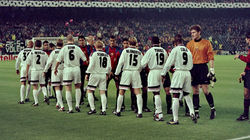 |
|---|---|---|
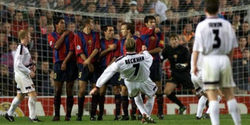 |  | 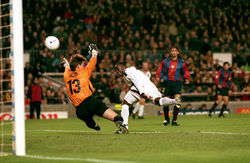 |
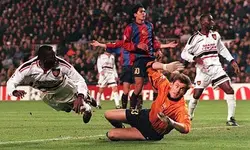 | 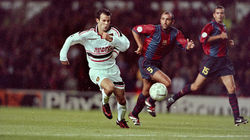 | 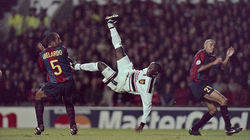 |
 |  |  |
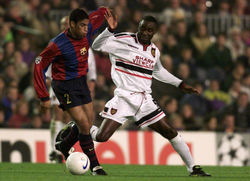 | 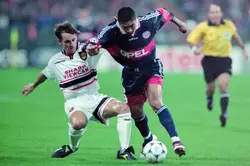 |  |
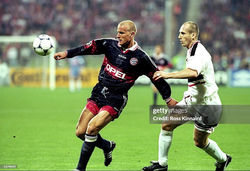 |  |  |
 | 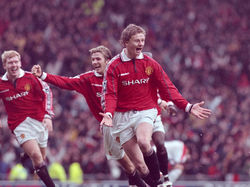 |  |
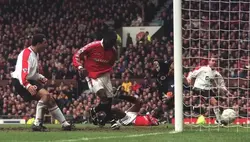 |  |  |
 |  |

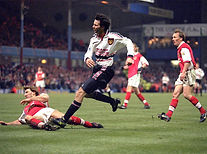


In the final weeks of the league season, Arsenal emerged as a creditable challenger to United. Both clubs were also paired together in the semi-final of the FA Cup, decided by a replay as the original game finished goalless. Keane was sent off in the second half and United conceded a penalty late into the match with the score 1–1. Dennis Bergkamp's effort was saved by Peter Schmeichel. Ferguson hoped his team "could at least take it to a penalty shoot-out", but instead the match was settled in extra time: Giggs ran the length of the pitch and evaded several Arsenal players to score the winning goal. United went on to beat Newcastle United in the FA Cup final and completed the double – a week earlier the team had regained the Premiership title.
United's progression in the Champions League was promising compared to previous seasons. The team eliminated Inter Milan at the quarter-final stage and faced Juventus in the last four of the competition. A late goal scored by Giggs in the first leg earned the team a 1–1 draw, but in spite of conceding an away goal, Ferguson was adamant of United's chances of reaching the final: "... something tells me we are going to win. The nature of our club is that we torture ourselves so much that the only way to get relief is by winning over there."[111] At the Stadio delle Alpi, striker Filippo Inzaghi scored twice to put Juventus 3–1 up on aggregate. Keane headed in a Beckham cross to halve the deficit just before half-time, but was later shown a yellow card for a foul on Edgar Davids, which prevented him from playing in the final. Yorke equalised, before Cole added a third to win the match outright. Keane's performance merited praise from Ferguson:
"It was the most emphatic display of selflessness I have seen on a football field. Pounding over every blade of grass, competing if he would rather die of exhaustion than lose, he inspired all around him. I felt it was an honour to be associated with such a player."
 |  | 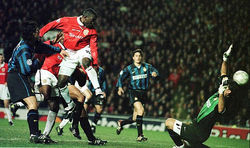 |
|---|---|---|
 | 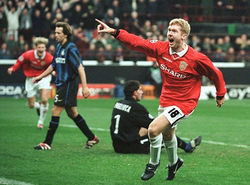 |  |
 |  | 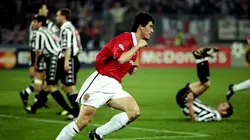 |
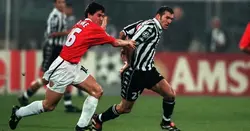 |
THE TREBLE COMPLETE
Days after the FA Cup final, United travelled to Barcelona, the setting for the UEFA Champions League final. Ferguson contemplated his team selection against Bayern Munich; suspensions to Scholes and Keane ruled both players out of the match. Beckham was positioned in centre midfield, while Giggs moved to the right wing and Blomqvist started on the left – changes the manager felt would prevent the opposition from playing narrow. United conceded in the first six minutes of the final, from a Mario Basler's free kick. Sheringham, who came on for Blomqvist, equalised from a corner in the first minute of additional time. McClaren told Ferguson to get the team organised for extra time, to which he replied, "Steve, this game isn't finished." Three minutes into added time, Solskjær scored the winner, which for United completed an unprecedented treble. Ferguson, interviewed moments after, said, "I can't believe it. Football, bloody hell. But they never gave in and that's what won it." He and Schmeichel, the stand-in captain, jointly lifted the cup during the trophy presentation.




A crowd of over 500,000 people turned out on the streets of Manchester to greet the players, who paraded through the city in an open-top bus. As European champions, United were invited to play in the Intercontinental Cup. The club also entered the inaugural Club World Championship, which was held in Brazil. This brought about a potential fixture congestion so United accepted the FA's recommendation of withdrawing from the FA Cup, the first holders to do so. In later years, Ferguson elaborated on the club's decision: "We did it to help England's World Cup bid. That was the political situation. I regretted it because we got nothing but stick and terrible criticism for not being in the FA Cup when really, it wasn't our fault.
A REPLACEMENT FOR SCHMEICHEL



1999–2002: Title hat-trick, retirement plan
Schmeichel's decision to leave United after eight seasons prompted Ferguson to bring in replacements: Mark Bosnich from Aston Villa and Italian Massimo Taibi. The latter featured in four matches, the last of which a 5–0 defeat at Chelsea in October 1999; he was not selected again by Ferguson. United ended the 1999–2000 league season as champions, with just three defeats and a record points margin of 18. In December 1999, the club beat Palmeiras in Tokyo to win the Intercontinental Cup, but a month later exited at the group stage of the inaugural Club World Championship, although Ferguson stated the tournament was "fantastic". United failed to retain the Champions League, as they lost in the quarter-final stage to eventual winners Real Madrid. Ferguson sought to strengthen his squad and signed Fabien Barthez from Monaco for £7.8 million.
In the 2000–01 season, United retained the league title for a third season, becoming only the fourth side in history to do so. The achievement was overshadowed by reports of a rift between the club's board and Ferguson. He told the club's television channel MUTV that he was prepared to sever all ties with the club, once his contract ended the following year: "The decision has been taken. I'm going to leave the club. I'm disappointed with what has happened because I was hoping something would be sorted out. It hasn't happened as I thought it would and that's all there is to it." Both parties eventually reached a compromise which pleased Ferguson: "I am delighted we've settled this. When you have been at the club as long as I have it gets in your blood." Age was one of the factors in Ferguson's decision to retire: reaching 60 acted as a "psychological barrier ... It changed my sense of my own fitness, my health."
A NEW STRIKING FORCE



He also monitored the progress of Ruud van Nistelrooy, "a striker of the highest calibre". He met the player and his agent in Manchester to discuss formalities and was informed of Van Nistelrooy's troubled right knee. Ferguson was not agitated by this; he recalled from experience a similar niggle that did not stop his playing career. Van Nistelrooy, however, failed his medical, but Ferguson reassured him that "we might yet find a way out of the nightmare". The deal was resurrected in April 2001 for a British record transfer fee of £19 million.
In May 2001, McClaren left to become Middlesbrough manager, with Jimmy Ryan being named assistant to Ferguson for the duration of the campaign. United once more broke their transfer record with the purchase of Juan Sebastián Verón from Lazio for a reported £28.1 million. In August 2001, Stam was transferred to Lazio for £16 million. The player reportedly moved because of claims in his autobiography Head to Head; Stam implied that Ferguson illegally contacted him about a move to Manchester United, before informing PSV. Ferguson said he sold the player because the club needed to cut back on its "massive wage bill". He replaced the defender with Laurent Blanc, a long sought-after target. In an interview with Alastair Campbell eight years after, Ferguson described his biggest mistake at the club was "letting go of Jaap Stam. No question".
The club endured a poor first half to the season and languished in ninth position after a home defeat by West Ham in December 2001. On the night of Christmas Day, Ferguson shelved his retirement plan. His family convinced him to remain in charge of United and Ferguson informed Watkins of his u-turn the following day.
Once Ferguson publicised his decision to remain in February 2002, United's form improved. The team won 13 out of 15 matches, though finished third in the league behind Arsenal and Liverpool. United were unsuccessful in Europe, losing their Champions League semi-final on away goals to Bayer Leverkusen. Early exits from the League Cup and FA Cup meant they ended the season trophyless. Ferguson himself said that the decision to announce his retirement had resulted in a negative effect on the players and on his ability to impose discipline.
2002–2006: Rebuilding and transition
In June 2002, Ferguson appointed Carlos Queiroz as his new assistant. The recommendation came from Andy Roxburgh, at a time when United began scouting for southern-hemisphere footballers and wanted a multilingual coach. Ferguson was so impressed with Queiroz after their first meeting, he offered him the job "right away". In July 2002, United paid £29.3 million for Leeds United defender Rio Ferdinand. The club broke the British transfer record once more, though this did not concern Ferguson: "We have the right to try and improve ourselves and there's nothing wrong with that."
United signed Cristiano Ronaldo in August 2003.
The 2002–03 season began rather poorly for United; the club made their worst start to a league campaign in 13 years. In a column for The Daily Telegraph, Hansen said Ferguson "will recognise this difficult start to the season for what it is: the greatest challenge of his career". Ferguson's response was typically bullish:
I don't get paid to panic. We have had plenty of stuttering starts. My greatest challenge is not what's happening at the moment. My greatest challenge was knocking Liverpool right off their fucking perch. And you can print that.
Several players were sent away for surgery in this period, a "minor gamble" Ferguson took in the hope they would return energised. Defeats, such as the one to Manchester City at Maine Road in November 2002, forced United to change their playing style. The team "moved the ball forward more and quicker rather than concentrating on possession ratios," and the coaching staff tried accommodating Diego Forlán with Ruud van Nistelrooy, before settling with Paul Scholes. United's league form improved as the season went on despite defeat by Liverpool in the 2003 Football League Cup Final and they overhauled Arsenal to win the Premier League for an eighth time in May 2003. The team were eliminated in the Champions League quarter-final to Real Madrid over two legs; Ferguson described the second match, a 4–3 win at Old Trafford as "epic".
After a season at United, Queiroz left to manage Real Madrid in June 2003. Ferguson anticipated his deputy would return – "Three months later, he was wanting to quit Madrid," and for that reason did not appoint a replacement. In the summer, David Beckham also moved to Real Madrid, while Juan Sebastián Verón joined Chelsea. United in the meantime rebuilt their team: Tim Howard replaced Barthez in goal and Kléberson, Eric Djemba-Djemba and Cristiano Ronaldo came in to bolster the squad. Ronaldinho might have also joined "had he not said yes, then no, to our offer".
In December 2003, Rio Ferdinand was banned from playing football for eight months after he failed to present himself at a drugs test. Ferguson in his autobiography ten years later blamed the drug testers, who "...didn't do their job. They didn't go looking for Rio". The absence of Ferdinand hampered United's defence of the Premier League in the 2003–04 season; the team finished third behind Arsenal's "Invincibles" and Chelsea. In Europe, they experienced defeat at the hands of eventual winners Porto. Ferguson felt it was possible "not because of the performance of the players but because of the referee", who disallowed a legitimate Scholes goal that would have been enough to progress. United ended the campaign as FA Cup winners, beating Millwall 3–0 in the 2004 final.
At the beginning of the 2004–05 season, teenage striker Wayne Rooney (the world's most expensive teenager at more than £20 million) and Argentine defender Gabriel Heinze joined United while Cristiano Ronaldo continued where he had left off the previous season by putting in more match-winning performances. But the lack of a striker after Ruud van Nistelrooy spent most of the season injured saw the club finish third for the third time in four seasons. In the 2004–05 FA Cup, they lost on penalties to Arsenal in the final. A second-round exit from the Champions League at the hands of Milan and a semi-final exit from the League Cup at the hands of eventual winners Chelsea (who also clinched the Premier League title) meant that 2004–05 was a rare instance of a trophyless season for United. During the season, Ferguson managed his 1,000th game in charge of United in a 2–1 home win against Lyon.
Ferguson's preparations for the 2005–06 season were disrupted by a high-profile dispute with major shareholder John Magnier, over the ownership of the racehorse Rock of Gibraltar. When Magnier and business partner J. P. McManus agreed to sell their shares to American business tycoon Malcolm Glazer, it cleared the way for Glazer to acquire full control of the club. This sparked violent protests from United fans, and disrupted Ferguson's plans to strengthen the team in the transfer market. In spite of this, United looked to solve their goalkeeping and midfield problems. For this, they signed the Dutch goalkeeper Edwin van der Sar from Fulham and Korean star Park Ji-sung from PSV.
The season was one of transition. On 18 November, Roy Keane officially left the club, his contract ended by mutual consent. United failed to qualify for the knock-out phase of the UEFA Champions League. In the January transfer window, Serbian defender Nemanja Vidić and French full-back Patrice Evra were signed, and the side finished in second place in the league, behind runaway winners Chelsea. Winning the League Cup was a consolation prize for lack of success elsewhere. Ruud van Nistelrooy's future at Old Trafford was in doubt after not starting in the League Cup final, and he departed at the end of the season.
Before the start of the new season, Ferguson received much criticism, particular in the guise of an article in The Guardian titled "Shredding his legacy at every turn".
Second Champions League trophy
Ferguson in 2008, standing beside assistant manager Carlos Queiroz
In 2006, Michael Carrick was signed to take Roy Keane's place in the team for a fee that eventually rose to £18 million. United started the season well, and for the first time ever won their first four Premier League games, United's best start since 1985. They set the early pace in the Premier League and never relinquished top spot from the tenth match of the 38-game season. The January 2006 signings had a huge impact on United's performances – Patrice Evra and Nemanja Vidić came in to form a solid back line along with Rio Ferdinand and skipper Gary Neville. The signing of Carrick brought stability and further creativity in the United midfield, forming an effective partnership with Paul Scholes. Park Ji-sung and Ryan Giggs both underlined their value to the first team squad by adding significant pace and incisiveness in attack with Wayne Rooney and Cristiano Ronaldo.
Ferguson celebrated the 20th anniversary of his appointment as manager of Manchester United on 6 November 2006. Tributes also came from Ferguson's players, both past and present, as well as his old foe, Arsène Wenger. The party was spoiled the following day when United endured a single-goal defeat at the hands of Southend United in the fourth round of the League Cup. On 1 December it was announced that Manchester United had signed 35-year-old Henrik Larsson on loan, a player that Ferguson had admired for many years, and attempted to capture previously. On 23 December 2006, Cristiano Ronaldo scored the club's 2,000th goal under Ferguson in a match against Aston Villa.
Manchester United subsequently won their ninth Premier League title but were denied a unique fourth double by Chelsea's Didier Drogba scoring a late goal in the FA Cup final at Wembley Stadium. In the Champions League, the club reached the semi-finals, recording a 7–1 home win over Roma in the quarter-final second leg, but lost at the San Siro to Milan 3–0 in the second leg of the semi-final after being 3–2 up from the first leg.
For the 2007–08 season, Ferguson made notable signings to reinforce United's first team. Long-term target Owen Hargreaves joined from Bayern Munich, young Portuguese winger Nani and Brazilian playmaker Anderson joined soon after, while the last summer signing was West Ham and Argentina striker Carlos Tevez after a complex and protracted transfer saga.
Despite getting some retribution on Chelsea by beating them in the Community Shield, United suffered their worst start to a league season under Ferguson, drawing their first two league games before suffering a 1–0 defeat by local rivals Manchester City. United, however, recovered and began a tight race with Arsenal for the title. After a good run of form, Ferguson claimed that throughout his time at Manchester United, this was the best squad he had managed to assemble thus far.
On 16 February 2008, United beat Arsenal 4–0 in an FA Cup fifth round match at Old Trafford, but were knocked out by eventual winners Portsmouth in the quarter-final on 8 March, losing 1–0 at home.[171] United having had a penalty claim turned down, Ferguson alleged after the game that Keith Hackett, general manager of the Professional Game Match Officials Board, was "not doing his job properly". Ferguson was subsequently charged by The FA with improper conduct, which he decided to contest. This was the second charge Ferguson faced in the season, following his complaints against the referee after United lost 1–0 at Bolton Wanderers – a charge he decided not to contest.
On 11 May 2008, Ferguson led Manchester United to a tenth Premier League title, exactly 25 years to the day after he led Aberdeen to European glory against Real Madrid in the Cup Winners' Cup. Nearest rivals Chelsea – level on points going into the final round of matches, but with an inferior goal difference – could only draw 1–1 at home to Bolton, finishing two points adrift of the champions. United's title win was sealed with a 2–0 win over Wigan Athletic, managed by former United captain Steve Bruce.
On 21 May 2008, Ferguson won his second European Cup with Manchester United as they beat Chelsea 6–5 on penalties in the Luzhniki Stadium in Moscow, following a 1–1 draw after extra time in the first ever all-English UEFA Champions League Final. A penalty miss from Cristiano Ronaldo meant that John Terry's spot-kick would have given the trophy to Chelsea if successfully converted, but Terry missed his penalty and in the end it was Edwin van der Sar's blocking of a Nicolas Anelka penalty which gave the trophy to Manchester United for the second time under Ferguson and for the third time overall.
World champions and further league titles
Ferguson with Sebastian Piñera in 2010
Although the team had a slow start to the 2008–09 season, United won the Premier League with a game to spare,[181] making Ferguson the first manager in the history of English football to win the top division three times consecutively, on two separate occasions. Ferguson had now won 11 league titles at Manchester United, and the 2008–09 season title success put them level with Liverpool as league champions on a record 18 occasions in total.
They also won the League Cup on penalties after a goalless draw in the final against Tottenham, after becoming the first British club to win the FIFA Club World Cup in December 2008.
They contested the Champions League final against Barcelona on 27 May 2009 but lost 2–0, thus failed to defend the trophy.
In 2009–10 season, Ferguson added another League Cup to his honours list as United defeated Aston Villa 2–1 in the final on 28 February 2010, United's first ever successful knockout cup defence. However, his dreams of a third European Cup were ended a few weeks later when United were edged out of the competition in the quarter-finals by Bayern Munich on away goals. And their hopes of a record 19th league title were ended on the last day of the season when Chelsea beat them to the Premier League title by one point, crushing Wigan Athletic 8–0 and rendering United's 4–0 win over Stoke City meaningless.
He ended the following season by winning his 12th and Manchester United's 19th league title and thus overtaking Liverpool's record of 18. Manchester United faced Barcelona again on 28 May 2011 in the 2011 Champions League final, their third in four years, but United lost 3–1. Analyst Alan Hansen stated that he believed Ferguson was "the key component" in United's success that season, so key in fact that "[he] would have claimed the crown with any of the other top sides had he been in charge of them".[189] With Edwin van der Sar, Gary Neville and Paul Scholes all retiring in 2011, Ferguson spent big by signing defender Phil Jones from Blackburn and winger Ashley Young from Aston Villa for around £17 million each, and goalkeeper David de Gea from Atlético Madrid for around £19 million.
The following season United managed to beat rivals Manchester City in the 2011 FA Community Shield and eliminated them in the FA Cup third round, but ended the season below City, who won their first Premier League title on goal difference. This bitter and slim defeat prompted Ferguson to sign star-striker Robin van Persie, who was the Premier League Golden Boot title-holder, from another arch-rival Arsenal on 17 August 2012.
The 2012–13 season saw Ferguson guide United to become league champions for the 20th time, claiming the title with a 3–0 home win over Aston Villa on 22 April 2013 with four matches to spare; Van Persie scored all the goals with a first half hat-trick en route to retain the Golden Boot. His final game in charge, his 1,500th in total, saw United play out a 5–5 draw with West Bromwich Albion. The result meant United finished the season 11 points ahead of runners-up Manchester City. Earlier in the season, on 2 September 2012, Ferguson managed his 1,000th league game with United playing against Southampton. United won the game 3–2 thanks to another hat-trick from Van Persie. Two weeks later, he won his 100th game in the Champions League with a 1–0 win over Galatasaray at Old Trafford.
Retirement
On 8 May 2013, Ferguson announced that he had decided to retire as manager at the end of the football season, but would remain at the club as a director and club ambassador. The Guardian announced it was the "end of an era", while UEFA president Michel Platini referred to Ferguson as "a true visionary". Former Manchester United players Paul Ince and Bryan Robson agreed that Ferguson would be "a hard act to follow". Manchester United co-chairman Joel Glazer said, "His determination to succeed and dedication to the club have been truly remarkable." Ferguson revealed that he had in fact decided that he was going to retire back in December 2012 and that it had been very difficult not to reveal his plans. Ferguson's decision to retire saw United shares fall 5% on the New York Stock Exchange.
On 9 May 2013, Manchester United announced Everton manager David Moyes would replace Ferguson as the club manager from 1 July, having signed a six-year contract. In Ferguson's final match in charge, Manchester United drew 5–5 at West Bromwich Albion, a hat-trick from Romelu Lukaku, later a United player, denying Ferguson a final victory.
Ferguson released his second autobiography in October 2013 called My Autobiography. In January 2014, Ferguson was appointed as the UEFA Coaching Ambassador, and said it was "an honour and a privilege" to be given the role. In April 2014, it was announced that Ferguson would be taking up a "long-term teaching position" at Harvard University, where he would be lecturing on a new course titled "The Business of Entertainment, Media and Sports". This came six months after he revealed his blueprint for success was included in the Harvard Business Review in a series of interviews with Anita Elberse. His book, Leading: Learning from Life and My Years at Manchester United, was published in collaboration with billionaire venture capitalist, author and former journalist Michael Moritz in August 2015.
Ferguson celebrated the 20th anniversary of his appointment as manager of Manchester United on 6 November 2006. Tributes also came from Ferguson's players, both past and present, as well as his old foe, Arsène Wenger. The party was spoiled the following day when United endured a single-goal defeat at the hands of Southend United in the fourth round of the League Cup. On 1 December it was announced that Manchester United had signed 35-year-old Henrik Larsson on loan, a player that Ferguson had admired for many years, and attempted to capture previously. On 23 December 2006, Cristiano Ronaldo scored the club's 2,000th goal under Ferguson in a match against Aston Villa.
Ferguson celebrated the 20th anniversary of his appointment as manager of Manchester United on 6 November 2006. Tributes also came from Ferguson's players, both past and present, as well as his old foe, Arsène Wenger. The party was spoiled the following day when United endured a single-goal defeat at the hands of Southend United in the fourth round of the League Cup. On 1 December it was announced that Manchester United had signed 35-year-old Henrik Larsson on loan, a player that Ferguson had admired for many years, and attempted to capture previously. On 23 December 2006, Cristiano Ronaldo scored the club's 2,000th goal under Ferguson in a match against Aston Villa.
Ferguson celebrated the 20th anniversary of his appointment as manager of Manchester United on 6 November 2006. Tributes also came from Ferguson's players, both past and present, as well as his old foe, Arsène Wenger. The party was spoiled the following day when United endured a single-goal defeat at the hands of Southend United in the fourth round of the League Cup. On 1 December it was announced that Manchester United had signed 35-year-old Henrik Larsson on loan, a player that Ferguson had admired for many years, and attempted to capture previously. On 23 December 2006, Cristiano Ronaldo scored the club's 2,000th goal under Ferguson in a match against Aston Villa.






